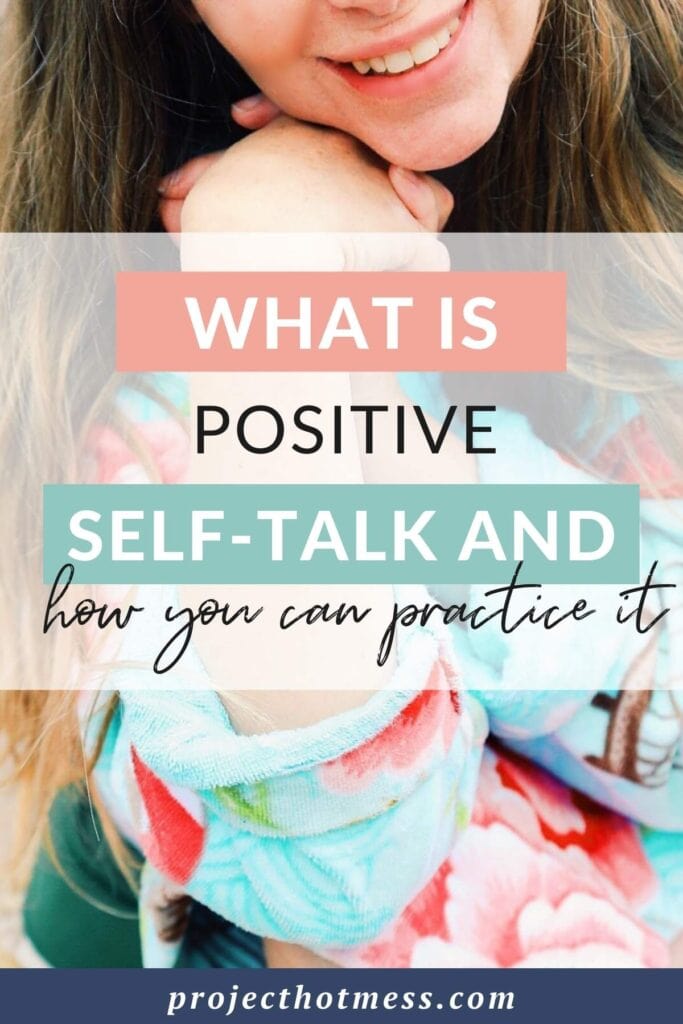What Is Positive Self-Talk And How You Can Practice It (Examples Included)
Have you ever had one of those days where everything seems to be going wrong? Your alarm didn’t go off, so you slept in and the kids are late for school. You spilled coffee all over your shirt, burn the toast, forgot it was school photo day… and then you got stuck in traffic.
By the time you drop the kids off, you’re feeling frazzled and stressed out.
Nothing seems to be going right and the more frustrated you get, and the more you say ‘just my luck’ every time something goes wrong, the more negative things seem to pile on…
What might seem like a bad day, is actually an example of how powerful our thoughts can be. Our thoughts can either keep us stuck in a negative spiral or if we can recognize this pattern, we can interrupt these negative thoughts of “everything is going wrong for me” or “everything I touch breaks” (or even worse) and replace them with positive self-talk.
While it might seem a little woo woo and like a bad Instagram caption of ‘think yourself happy’ there is a lot of research and neuroscience behind positive self-talk and the profound effect it can have on our mindset and on our lives.

What Is Positive Self-Talk?
Positive self-talk is a way of reframing our thoughts in a more positive light. It’s about speaking to ourselves in a kind and encouraging way, instead of putting ourselves down.
Instead of thinking “I’m such a screw up,” we tell ourselves “I made a mistake, but I’m learning and I’ll do better next time, positive self-talk can help us to feel calmer, more confident, and more in control of our lives.
We’ve all heard the saying ‘be kind to yourself’ – positive self-talk is putting this statement into action.
Furthermore, it’s taking the internal dialogue that has created our unconscious beliefs about ourselves, the internal chatter that is often full of negative comments and using our conscious thoughts to create a positive change through positive thinking and positive self talk.

But… Does Positive Self-Talk Actually Work?
In short… yes.
Positive self-talk is closely related to and interwoven in a psychological practice called Cognitive Behavioural Therapy.
Cognitive Behavioral Therapy, or CBT, is a type of therapy that focuses on helping people to change their thinking patterns and behaviors. CBT can be used to treat a wide range of mental health conditions, including anxiety and depression.
The aim of CBT is to help people to understand how their thoughts and behaviors can affect their mood, and to learn new ways of thinking and behaving that are more positive and helpful.
In short, CBT is used to explore thoughts and behaviors and identify any patterns that are causing problems. You can then learn new techniques for managing your thoughts and behaviors, one of which includes replacing negative self-talk with positive self-talk.
Ultimately, the goal of CBT is to help people to feel better by teaching them how to think and behave in more positive ways, which is why understanding positive self-talk, and how to apply it to your life, can be incredibly beneficial in a wide range of situations.

What Are The Benefits Of Positive Self-Talk?
When you engage in positive self-talk, you’re essentially retraining your brain to focus on the good instead of the bad. While this alone is a fantastic benefit of positive self-talk, there are additional benefits as well which include:
- improved mood
- increased confidence and self-esteem
- reduced stress levels
- better sleep
- more motivation
- decreased anxiety
- more optimistic outlook
- increased resilience
- healthier lifestyles and other health benefits (often associated with decreases in stress hormones)
You can see why learning a few key strategies to help you improve and encourage more positive self-talk can have a widespread positive effect on your life.

Can You Be ‘Too Positive’? (Toxic Positivity)
We’ve all heard the phrase ” fake it till you make it.” This is the idea that if we act like we’re happy and positive, eventually we’ll actually feel that way.
And while there’s nothing wrong with putting on a brave face during tough times, there’s a danger in taking this too far.
When we constantly ignore our negative emotions and try to push through them without processing them, this is known as toxic positivity.
Toxic positivity is all about maintaining an unrealistic positive outlook, even in the face of adversity.
This can lead to harmful behaviors, such as numbing our emotions with drugs or alcohol, or denying that there’s a problem altogether.
It’s important to remember that it’s okay to feel sad, angry, or scared sometimes. In fact, it’s perfectly normal to have a full range of emotions.
Trying to suppress our negative feelings can actually make them stronger in the long run.
So while it may feel uncomfortable at first, don’t be afraid to let yourself feel those emotions and process them in a healthy way.
Keep in mind, negative emotions and negative feelings are different from negative self-talk, and allowing ourselves to process our emotions and work through our feelings can actually help us to develop better self-esteem and increase our positive-self talk.

How To Practice Positive Self-Talk
Positive self-talk can be used in any situation where you’re finding yourself feeling down or stressed, especially when you continue to repeat negative thoughts to yourself.
We all have an inner voice – the one that talks to us throughout the day, commenting on everything we do. This inner voice can be our biggest cheerleader or our worst critic.
It all depends on what we say to ourselves, so it’s important to learn how to do this.
The first step in practicing positive self-talk is identifying our pattern of negative thinking.
While there are many types of negative thinking (also known as cognitive distortions, or ‘faulty thoughts’), there are four main categories that most of these thought patterns fall into. These are:
- Magnifying – You focus only on the negative and worst parts of an issue or situation, without acknowledging anything good that happens. For example, you make a small mistake, and instead of thinking “everyone makes mistakes, it’s not a big deal,” you think “I’m such an idiot, I can’t believe I did that.”
- Personalizing – You hold yourself responsible for things that are out of your control. For example, you might think “I’m such a terrible friend, I can’t believe she didn’t invite me to her party.”
- Polarizing – You see everything as black and white, good or bad, perfect or not at all. For example, if you don’t get all of your work done you might think “it’s not perfect, I don’t know why I even bother, I’m such a failure”.
- Catastrophizing – You expect the worst-case scenario in any given situation. For example, you might think “I’m going to fail this test, I just know it.”

Once you’ve identified the type of negative thinking you tend to do, you can start to counter it with positive self-talk.
For example, if you find yourself catastrophizing, try to come up with a more realistic outcome, such as “I’m going to study hard and do my best, and even if I don’t get the grade I want, I’ll still be okay.”
If you’re someone who tends to personalize things, try to remind yourself that you can’t control everything and that not everything is about you. For example, “Just because she didn’t invite me to her party doesn’t mean she doesn’t like me, there could be any number of reasons why.”
It takes practice to change the way we talk to ourselves, but it’s worth it. When we do, we’ll find that our inner voice becomes our biggest cheerleader, and we’re better equipped to handle whatever life throws our way.

What Are Some Positive Self-Talk Examples?
Now we know what positive self-talk is, what the benefits are, and our first steps to practicing it, let’s take a look at some examples of positive self-talk, and how we can turn negative self-talk into positive self-talk.
Remember, positive self-talk can be anything that you say to yourself that is encouraging, supportive, and helps you to feel good about yourself.
Some examples of positive self-talk include:
Negative self-talk: “My house is always a mess, I’m such a bad mom.”
Positive self-talk: “My home is well lived in. I don’t need a clean home to prove how much I love my children. I show them and tell them every day.”
Negative self-talk: “I can’t possibly work and be a good mom. It’s impossible.”
Positive self-talk: “Working while being a mom is a lot. It’s hard work and demanding at times. It’s okay to not get it right all of the time, I can only do my best for myself and for my family.”
Negative self-talk: “My friends haven’t spoken to me in a week. I probably said something to upset them. I’m such a bad friend.”

Positive self-talk: “My friends have busy lives and they understand I am busy too. Sometimes this means we won’t talk as much. I know my friends are there when I need them, as I am for them too.”
Negative self-talk: “I’m so fat and out of shape. I don’t know how my husband still loves me. I’m not the woman he married.”
Positive self-talk: “My body is incredible and capable of amazing things. My husband loves all of me, just the way I am. We change and evolve through life together.”
Negative self-talk: “I’ll probably fail, I don’t know why I bother.”
Positive self-talk: “I will give it my all and do my best, and will be proud of myself for giving it a go.”
You can see from these examples how switching up negative self-talk and negative thinking for a more positive statement can have a big impact on the way we perceive ourselves.

Ideas To Improve Positive Self-Talk
Sometimes it can be difficult for us to switch up our negative attitude and replace it with a positive attitude. While we can clearly see the power of positive self-talk, past experiences, life events, mental health issues, negative events, and certain social situations can make adding positive self-talk into everyday life a challenge.
Seeking professional help is always a great option, and getting personalized help from someone specialized in paying close attention to helping you develop this new coping skill can have a huge impact on your own positive energy and day-to-day life.
In the meantime, there are a few other things you can do to help you improve your positive self-talk in a productive way:

1 – Write A Gratitude Journal
When we take time to focus on all the things we are grateful for and all of the positive things in our lives, it brings our attention and energy to all that is good.
Even if it’s just the little things to begin with, paying attention to these good things on a regular basis can help you when trying to improve your positive self-talk.
2 – Journaling
While we mentioned gratitude journaling, you can also use the practice of journaling to allow your thoughts to flow, which can in turn help you to understand your thought patterns and identify dysfunctional self-talk when it pops up.
A great way to do this is to simply journal out your running monologue, your inner thoughts, and whatever is going through your mind. Keep writing for as long as you can.
Then pay attention to any patterns that start to show over time.

3 – Surround Yourself With Positive People
We all know people who tend to look more on the bright side of life, and we also know negative people who, no matter what happens, they’re always able to put a negative spin on a situation.
It’s easy for us to take on the energy of the people around us, so take a look at who you have been spending time with and ask yourself if they are people who help improve your energy and increase your positivity, or who do the opposite?
4 – Improve Your Physical Health
We often talk about physical health and mental health as two separate things, but there is extensive research literature that shows they have a significant influence on each other.
The good news is, when we improve one, we often improve the other. If you want to improve your mental health, start looking at improving your physical health too and you might just find it’s a whole lot easier.

Can I Use Quotes Or Affirmations To Help With Positive Self-Talk?
Absolutely! Reading quotes or positive affirmations that speak to you can be a great way to remind yourself of how amazing and capable you are.
It can be helpful to keep a list of your favorite quotes or affirmations somewhere close by, so that when you’re feeling down, or engaging in negative self-talk, you have some positive words to read to help shift your thinking.
Some of our favorite positive self-talk quotes include:
- “You are not a drop in the ocean. You are the entire ocean in a drop.” – Rumi
- “You alone are enough. You have nothing to prove to anybody.” – Maya Angelou
- “Above all, be true to yourself, and if you cannot put your heart in it, take yourself out of it.” – Hardy D. Jackson
- “You are not a mistake. You are not a problem to be solved. But you are quite wonderfully you.” – Christopher Poindexter
- “Your time is limited, don’t waste it living someone else’s life.” – Steve Jobs

And some of our favorite positive self-talk affirmations include:
- “I am worthy of love and respect.”
- “I am strong and capable.”
- “I am enough, just as I am.”
- “I can achieve anything I set my mind to.”
- “I choose thoughts that empower me.”
- “I am surrounded by love and support.”
You can use these affirmations during stressful situations or difficult times, but it’s also good to include them in a daily practice to help you to train your subconscious mind to focus on positive thoughts.
Positive self-talk is a powerful tool that we all have at our disposal, and one that can make a big impact on the way we see and feel about ourselves.
We encourage you to experiment with different positive statements and affirmations to find ones that resonate with you, and to be patient and kind with yourself as you practice using positive self-talk more in your life.
Remember, it takes time and practice to change negative thinking patterns and develop more positive ones.
But we promise, it’s worth it!











